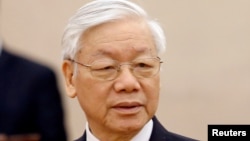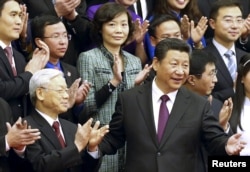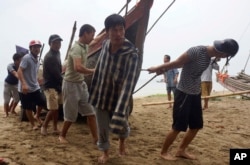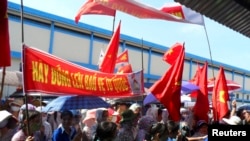Vietnam’s Communist Party head will have unprecedented power to keep relations stable with old foe China while pursuing stronger trade and security ties with the United States as he exercises his duties as the nation’s new president.
The legislature in Hanoi confirmed Communist Party General Secretary Nguyen Phu Trong as president Tuesday. He replaced Tran Dai Quang, a low-key leader with a police background, after Quang died last month from a long illness. Trong is scheduled to serve as president at least until 2021.
Trong’s double role as president and party head will let him mold a wealth of political experience into foreign and economic policy, Vietnam specialists say. In particular, Trong will get more access to foreign heads of state, who often do not see party heads as key political figures.
“As general secretary, it’s hard to know how internationally how to treat them, but as president, you’re acknowledged, they understand what presidents are,” said Adam McCarty, chief economist with Mekong Economics in Hanoi.
“As president-general secretary, he’ll be expected to have a lot more power and therefore be treated as a more serious player than just a president visiting other countries,” McCarty said.
Communist Party veteran
Trong, now 74, came from a “poor peasant” background and graduated from a linguistics program at Hanoi General University, his party’s website says. He joined the party 51 years ago and has held five tenures in its Political Bureau.
In 42 years of rule by the Communist Party of Vietnam, only its founder Ho Chi Minh ever served as both party head and president, but Vietnam lacked then today’s level of foreign relations or world economic clout.
Normally, the party chief and president effectively share power. Trong’s role resembles that of Chinese President Xi Jinping, also chief of the Communist Party of China.
Trong all but naturally became president because he was “first among equals” in the party and faced no challengers in the top ranks, said Murray Hiebert, deputy director of the Southeast Asia Program at the Center for Strategic and International Studies in Washington. Trong can more easily actualize his policies in government, he said.
Stronger economic, foreign policy action
Trong’s appointment this week is unlikely to change long-term government ambitions such as fostering an export-driven economy or striking a foreign policy balance between China and Western allies, analysts say.
One business person in the financial hub, Ho Chi Minh City, who did not want to be named for fear of angering the government, told VOA this week that common Vietnamese had little reaction to the leadership changes because it brought no tangible change such as health care reform or lower consumer prices.
But the president’s dual role will give him easier access to U.S. leaders. He is expected to push the United States for a bilateral trade deal as President Donald Trump shows interest in two-way pacts. Last year Trump pulled out of a 12-member Trans Pacific Partnership that included Vietnam.
Vietnam counts the United States as its No. 1 export market, worth $33 billion per year, or 20 percent of all goods shipped.
But Trong may need to overcome a U.S. view that communist Vietnam lacks a market economy, said Carl Thayer, professor emeritus with the University of New South Wales in Australia.
Washington might get a request as well to offer Vietnam more military aid, a growing option since the U.S. government lifted an arms sales ban in 2016, scholars say.
Tackling China
The Vietnamese president will use existing party-to-party as well as state-to-state channels to work with China, yet without coming off as pro-Beijing, scholars believe. In the past, party and government talks were held by different people.
No one in Vietnam is “pro-China,” Thayer said, but some are more willing than others to work with it.
“The policies on China to me are set and they provide a special conduit for relations that Vietnam can use,” he said.
China is Vietnam’s second biggest export destination and a top supplier of raw materials to factories that drive a fast-growing Vietnamese economy. But the two countries fought a border war in the 1970s and now contest sovereignty over parts of the South China Sea.
China took control of the disputed Paracel Islands in the 1970s and the two sides now compete for undersea oil drilling rights.
“He can be expected to continue to try to balance Vietnam’s relations between China and the United States,” Hiebert said. “He will look to China for trade and investment and to Washington for security support as China becomes more aggressive in the South China Sea.”
Tough on graft
Vietnam’s anti-corruption campaign that became visible to the public in 2016 is likely to intensify under Trong, according to the domestic news website VnExpress International says. It cites “numerous” crackdowns on top business people and government leaders to date.
Trong frowns on overtly lavish lifestyles, a hallmark of corruption, Thayer said.







